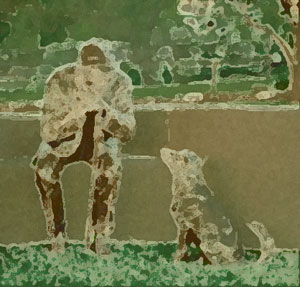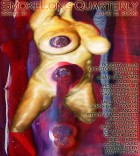The distant mountains are clothed by a shellfish bloom when he falls, an old man from a great height, a suicide. His young girlfriend flings herself after him, an angel in a nightdress. On his face, the word sex is carved—youths, one late night, with a knife. There are photographs of himself that he has left on park benches with his phone number; also, a report in the paper that his father performed abortions.
People gawk at the fallen bodies, and a woman says vultures, attacks the gathered crowd with an expensive-looking cardigan. A car alarm goes off. They think off-her-head. The woman is bruised under the eyes. Someone makes a cliché about suffering and she tells him to take a bath in a cold spring.
The ex-wife wonders as she slices radishes what she will tell the children. She examines the wear and tear on her cardigan. “Ick,” she says.
The house has dead carnations in vases, a computer in every room. The children throw themselves around on the furniture, and come into the kitchen to take handfuls of salad. She doesn’t say no. They seem doll-like. He had been her meal ticket. Yes, but…
The neighbors know him as an elderly man with dog—on a painting, Monet would have slapped on the ochre—the ageing terrier shat on their lawn and raced after the postman to bite him on the ankles; both man and animal had fine small teeth, permanent grins. There are huge cacti growing over his fence and sometimes you can see them flower. The cleaner left a bathroom tap on and water flooded over the carpets.
A ghost walks through the streets, naked; and the children argue about the bitterness in their salad.



 The SmokeLong Grand Micro Contest (The Mikey) is now an annual competition celebrating and compensating the best micro fiction and nonfiction online.
The SmokeLong Grand Micro Contest (The Mikey) is now an annual competition celebrating and compensating the best micro fiction and nonfiction online.